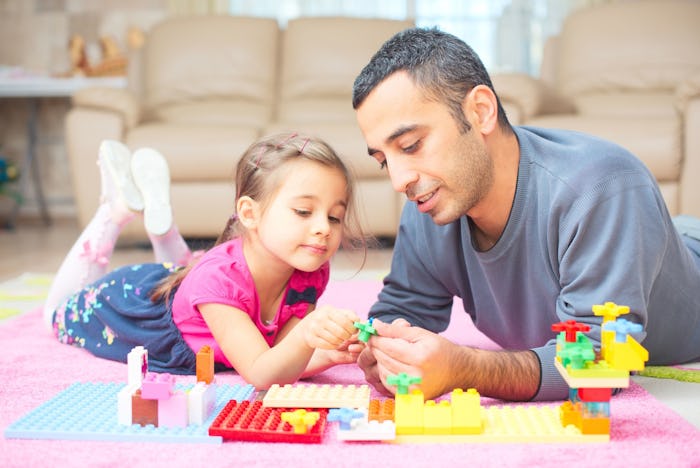Life

Here's Why STEM Toys Are So Beneficial To Your Kids, According To Science
STEM toys have been gaining popularity recently, and for good reason. As society and schools are encouraging kids to get into science, math, and technology, different child-related industries are looking for ways to assist (and, to be honest, cash in). As we head into the holiday season, and you start getting bombarded with advertisements, you might be wondering if STEM toys are worth the hype and the money. How do STEM toys help kids? As it turns out, they're definitely worth your consideration.
Getting young kids to build the intrigue and confidence it takes to garner a long-term interest in STEM subjects is paramount, noted Business Insider. STEM toys can help your little ones begin to dabble in relevant technological and scientific processes, develop skills in those areas, and gain confidence as they do so. STEM toys are often brightly colored and often involve light, music, or sound to draw in young kids, and the idea is that once little ones become involved in shaping and building something on their own, the love of the process will take over.
STEM toys are a way to maximize playtime, and often are enjoyable enough for parents and kids to play with together — which is, likely, the whole point.
According to Purdue University's Women in Engineering Program, toys can help children turn their ideas into reality, and toys which encourage building, critical thinking, and advanced mental processes are a great first step in inspiring kids towards a science, technology, engineering, or math career. The hope is that toys like that will help children realize they can impact the world through their ideas, Purdue suggested. Research shows that kids, especially girls, become interested in things that they are confident in doing. Introducing STEM concepts early through relatable and likeable toys can provide big benefits in how kids approach certain subjects in the future.
According to Fast Company, STEM sales only account for two to three percent of the toy market, but it is on the rise. Though STEM toys will likely never be a mass market, its fans are, largely, parents that are committed to education, and will likely be repeat customers that hopefully inspire growth. With STEM, "parents are more inclined to spend money because they don’t necessarily view the purchases as 'toys,' but rather as educational aids," Fast Company noted. This is one of the reasons that STEM toys are probably pricier than the average toys — the other is that these toys often involve electronic processes or parts, as well.
But, a toy doesn't necessarily have to be labeled STEM to promote STEM-related thinking or skill-building. When you break down the basic concepts of science, technology, engineering, and math, you'll find a foundation of sequencing, matching, building, and spatial planning and awareness. Many toys, especially those that encourage active thinking and process, are educational and have STEM-related benefits.
While early childhood educators have long stated the benefits of open-ended toys — toys where the child has to manipulate or create change in order to entertain themselves as opposed to entertainment being created via a button or switch — and STEM toys definitely implement this idea in order to encourage creativity and impact.
As it seems, STEM toys aren't going to go anywhere anytime soon, and it may be beneficial for parents to take a closer look at what their children are playing with. As public funding for arts, sciences, and physical education continues to get cut from school budgets, what can you do at home to ensure your kids are being challenged to use creative and critical thinking skills? How can you promote their problem-solving skills, their persistence in completing difficult tasks, their independence in creating valuable change? If there are benefits in the toys you choose for your babies, it couldn't hurt to try something new.
Check out Romper's new video series, Romper's Doula Diaries:
Watch full episodes of Romper's Doula Diaries on Facebook Watch.